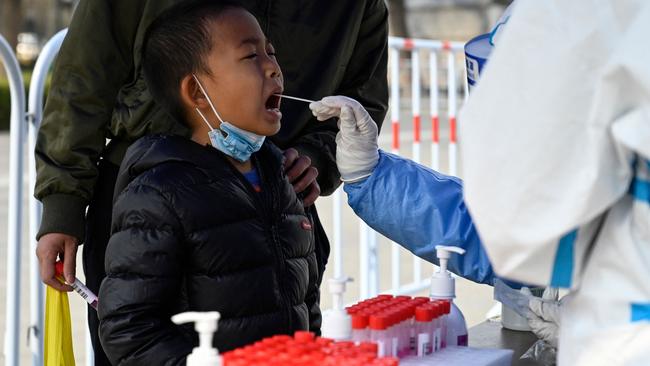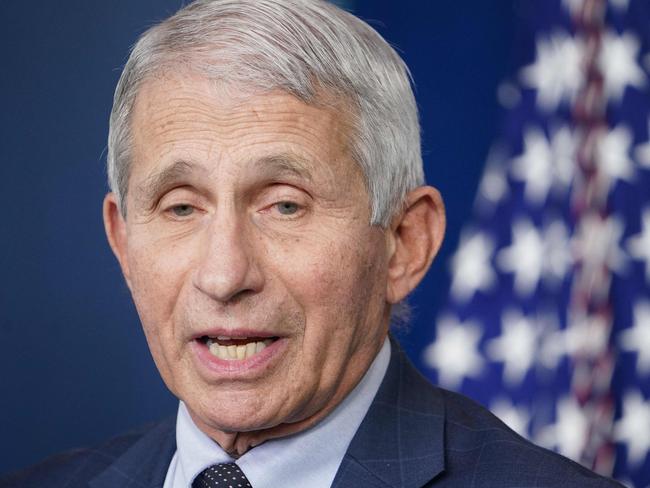Covid fears left behind in the wake of Ukraine
Russia’s invasion has brought the pandemic as a burning political issue to an end.

It’s worth trying at least to start drawing a few lessons from the Covid-19 pandemic, by far the most profound historical event in our lives, more than two years since it began.
First, fear fuelled by the media, not science, drove much of the response. Russia’s invasion of Ukraine has brought the pandemic as a burning political issue to an end, even though more than 1000 Americans – and many more people around the world – are still dying each day from or with Covid-19. Without the media to sustain fear, the pressure to reinstate measures will fade rapidly.
Joe Biden’s top public health adviser, Anthony Fauci, recently foreshadowed a seventh Covid-19 wave in the US, a warning that barely registered with a US media that is laser-focused on the war in Ukraine. The share of Democrat voters who thought Covid-19 was a severe health risk in the community dropped to 23 per cent in the most recent Morning Consult survey, the lowest level yet and down from 46 per cent just two months ago.
In a further tribute to the power of the media, 47 per cent of those who identify as very liberal (very left-wing) said Covid-19 was still a great risk to their personal health, compared with 12 per cent for self-identified conservatives.

Unlike the Spanish flu pandemic 100 years ago, when practically everyone knew someone who had died from the virus, few people would be aware of the Covid pandemic without media reminders. This is happening around the world.
German Chancellor Olaf Scholz was defending the ending of his country’s restrictions last week only a few months after locking down unvaccinated Germans in their homes. Vaccination levels and the disease itself haven’t changed much in that time, only the political will to annoy a jaded public waking up to the costs of the past two years. Indeed, just as the stealth Omicron variant takes off in Europe and vaccine protection wanes, European nations are dropping vaccine passports like hot potatoes.
The need for humility should be the second lesson. The health establishment was spectacularly wrong on almost every aspect of the pandemic, even demonising those willing to stand up to it.
Masks, lockdowns of businesses and schools, rampant testing, mandatory social distancing – none of it stopped the virus from spreading in a systematic way, as the evidence clearly suggests. Asymptomatic spread – a justification for locking down the healthy for months – even turned out to be grossly exaggerated. Vaccines didn’t stop transmission and they started to lose much of their effectiveness within months.
Overall, the response will go down as one of the greatest public health fiascos once a fair reckoning of the costs and benefits of measures emerge. Even China, often held up as the gold standard for disease management, has had to put tens of millions of people back into lockdown, raising questions about the effectiveness of lockdowns “even if done right, China-style”.
Not surprisingly, experts are delicately walking back their support, one measure at a time. It’s now fashionable to say closing schools was a mistake, doing particularly great harm to children from poorer families. According to US statistician Nate Silver, it was a disaster in the order of the invasion of Iraq. It’s also OK to say cloth masks didn’t work, as the evidence against them becomes overwhelming even for the numerically challenged.
Epidemiologist Mark Woodhouse, a member of SAGE, the academic body that recommended the British lockdown, has recanted in a new book, The Year the World Went Mad.
“The prospect of eliminating the virus in the UK had gone, certainly by the second half of February 2020,” he said in a recent interview. “It was already becoming very obvious (by mid-2020), not just in the UK but also across the whole world, just how extraordinarily damaging the lockdown was going to be.” Such a shame so few had the courage then to point out this obvious fact.
Joseph Fraiman, an emergency doctor based in Louisiana who had backed tough measures earlier in the pandemic, publicly apologised to lockdown critics this month given lockdowns had “obviously produced large harm and offered only a minimal benefit at best”. “The reality is hospitalisations and deaths were not reduced by 20 per cent by any policies,” he said. “If they were we would have had studies at this point that would have consistently identified that. And that just has not occurred at all.”
The New York Times, a champion of tough measures, published a high-profile article this month suggesting restrictions “haven’t made a big difference”. Whoops.
Recent US studies have shown a 25 per cent increase in alcohol-related deaths (especially among those aged 24 to 44), a 30 per cent increase in opioid deaths and a 20 per cent increase in road fatalities during the pandemic.
As with support for Vichy France after World War II, it soon will seem as if no one advocated for business and school closures or forced masking for hundreds of days to stop a highly contagious virus. Calls for formal inquiries and royal commissions into our handling of Covid-19 are nevertheless premature. Only when the current generation of leaders and health experts has moved on would such a venture reach a fair conclusion.






Assessing the impact of great historical events immediately in their wake is difficult. In 1972 Chinese leader Zhou Enlai famously said it was too early to tell the impact of the French Revolution.